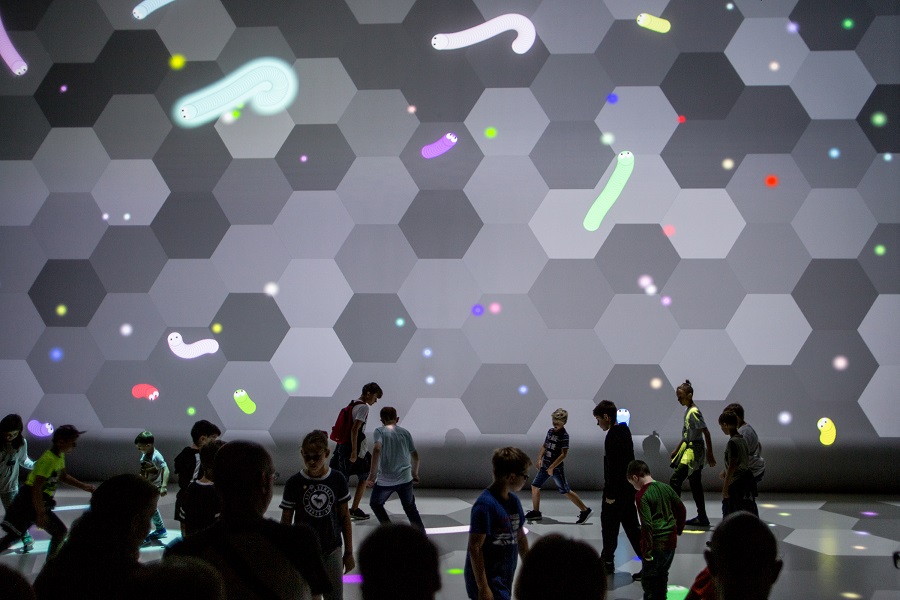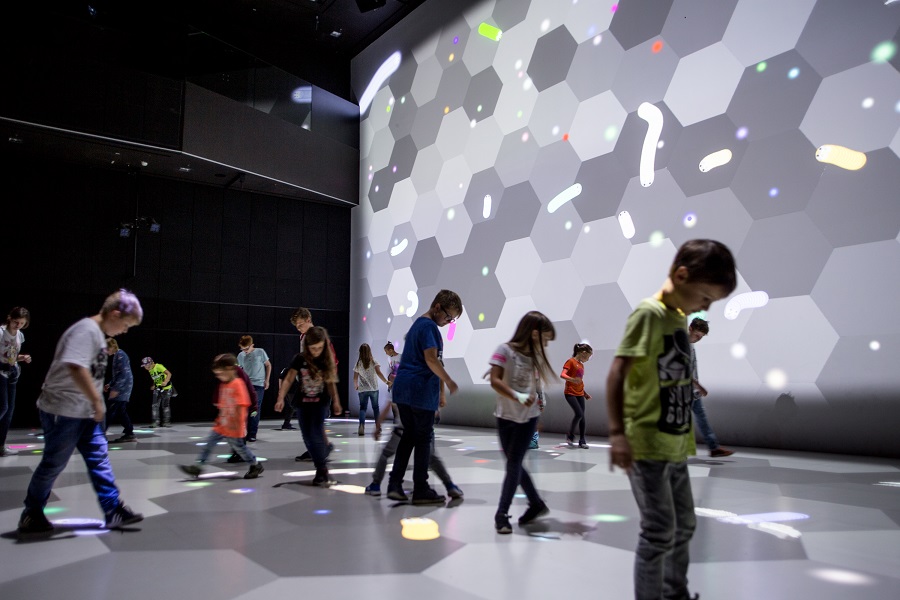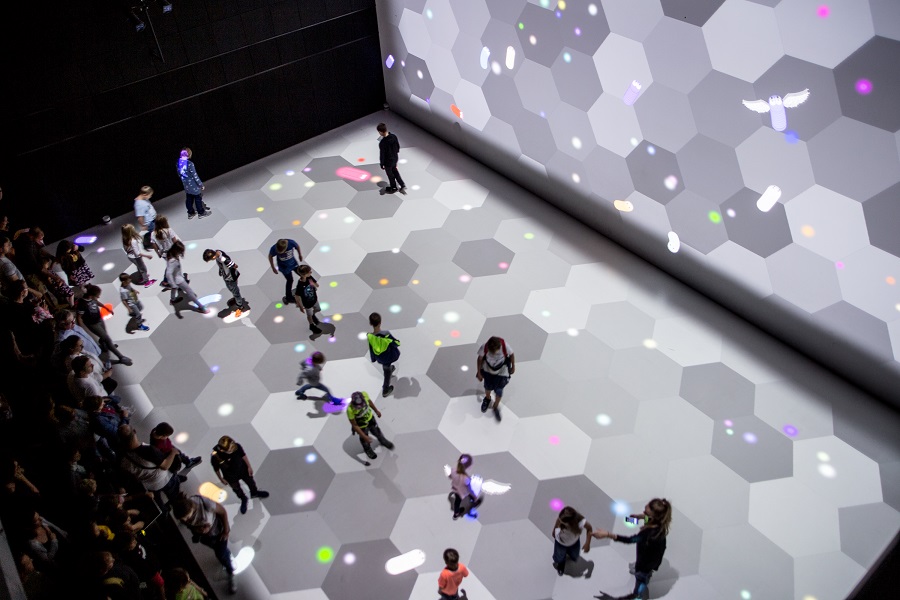Over the past four weeks, there’s been a new face at the Ars Electronica Futurelab, bent in concentration over the computer, or walking more and more often into the Ars Electronica Center next door and disappearing through the thick doors of Deep Space 8K. It was Ivonne Gattringer, developing a new version of slither.io, a computer game where players gather points as a snake – one that is especially suited to the laser tracking system and other requirements of Deep Space 8K. What’s special about that? Ivonne is not yet a fully trained programmer, but a polytechnic student with a passion for computer science. As part of the JKU Young Computer Scientists Program, she completed an internship right here in the laboratory and studio of Ars Electronica. Here, she and Dr. Hanspeter Mössenböck, initiator of the JKU Young Computer Scientists Initiative, speak about the program and what role the Ars Electronica Futurelab plays.

Credit: Vanessa Graf / Ars Electronica
Dr. Mössenböck, can you explain to us what the Young Computer Scientists Program is all about?
Dr. Hanspeter Mössenböck: The Young Computer Scientists Program is part of JKU Young Scientists, which is carried out in common with the Upper Austrian Stiftung Talente. It’s about giving talented young people in the MINT field a chance to go beyond the knowledge they get in school. We offer them university-level knowledge. The initiative exists not only in computer science, but also for mathematics, chemistry, physics and mechatronics.
In computer science in particular, we try to show how extensive the field actually is. In school, you often just learn basic user skills, Microsoft Office, maybe a little website design or video editing, but computer science is much more than that. We want to show how broad the field is – and which job prospects open up there. That’s also the reason why we divide the program into two parts: first there are six workshops on different topics, then there is a vacation program that we facilitate. In the workshops, we show what computer science is all about – only snippets of it, but still. In the internships, the students learn more about career prospects.
Ivonne, you’re in this Young Computer Scientist Program for a four-week internship at Ars Electronica Futurelab. Can you introduce yourself briefly?
Ivonne Gattringer: I’m Ivonne, right now I’m doing an internship here, working as a programmer. My job is a project for Deep Space 8K – adapting the game slither.io so that children can also play it in Deep Space 8K . Slither.io is a web application that became famous relatively quickly, where you play a snake that collects points. The more points you collect, the bigger you get. But if you bump into another snake’s body, you die and leave points behind that others can collect. There are a few tactics that you develop when playing it over time. In Deep Space, it works with laser tracking: the system recognizes you on the floor and the snake always moves along the floor where you are currently walking.

Credit: Vanessa Graf / Ars Electronica
Why did you apply for the Young Computer Scientists Program?
Ivonne Gattringer: A friend of mine did the Young Physics Scientists Program and she really liked it, she thought they were always learning exciting things. She used to think she knew a lot, but you learn lots of things that you just don’t know yet. Although I go to a polytechnic, there really were things at the workshops where I learned a lot, like the part about graphic design or the one about networks. For example, we spent the first half of a day looking closely at what hacking actually is – that was my favorite day by far.
There were three workshop days in total…
Ivonne Gattringer: Yes, exactly, there were three workshop days, on a Friday each time. It’s cool because you get good insight into what it’s like to study at the university level. We were in big uni lecture halls, but with not that many people.

Credit: Vanessa Graf / Ars Electronica
Today is already your second-to-last day as an intern. What are you taking away from your time at the Ars Electronica Futurelab?
Ivonne Gattringer: I must admit that it was a very interesting atmosphere. I’ve worked in larger offices for other internships, but here its different, because it’s not just people sitting around programming. It’s funny how many different kinds of people are at Futurelab, from the art world, from programming, there’s even someone who studied physics. It’s interesting to see how this place brings people together with so many different interests, and also how the personalities come together here.
It was also cool to program a game, I’d never done that before. I used to think it was be really hard, but it actually isn’t at all. Programs like Unity make it very easy for beginners like me. And I could finally use the things I learned in school! Until recently I thought, vectors, how pointless. When am I ever going to need that? You won’t believe it, but about half of the game I just developed here is based on vectors. I’ve never had to calculate so many vectors! So I have to admit: my math knowledge has improved a lot.
Why is the Ars Electronica Futurelab, which is not a traditional IT company, an interesting partner for this program from the JKU’s perspective?
Dr. Hanspeter Mössenböck: Ars Electronica Futurelab is not only a well-known partner, but is also interesting for the students because it’s a brand that is well-known beyond Linz. And you’re right, it may be a little different from other companies. We have a lot of traditional IT companies in the program, but also start-ups. But the Futurelab is looking into the future, it has an experimental character. So we’re very happy that it’s part of the program – alongside 15 other companies offering a total of 24 internships.
Find out more about the JKU Young Scientists Program here. To learn more about Ars Electronica, follow us on Facebook, Twitter, Instagram et al., subscribe to our newsletter, and check us out online at https://ars.electronica.art/news/en/.
